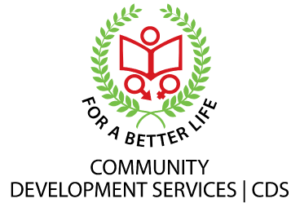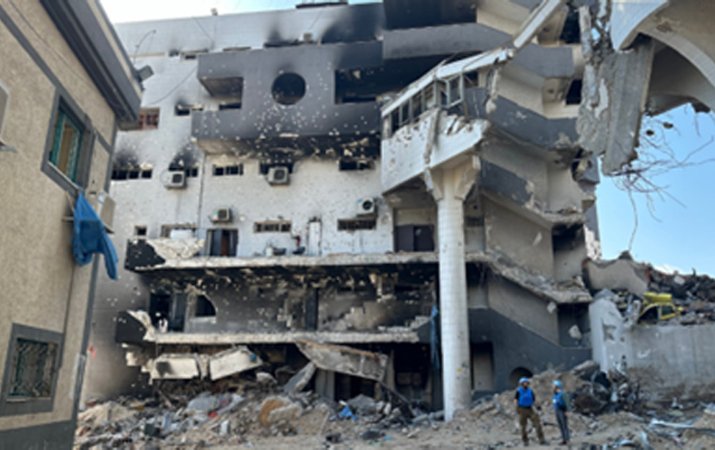Border conflicts and wars in Syria, Ukraine, Lebanon, Palestine, and Israel. Deadly and devastating humanitarian crises in Haiti and Sudan. Climate catastrophes, hurricanes in the US, and floods in South India, Nepal, and Sri Lanka. And cracks in the global economy are widening. Where do we go from here? What do we do? The war in the Middle East is creating hunger, starvation, displacement, denial of medical aid and support and immobility as human shields as weapons of war. It seems like peace is a far-fetched dream in the theatres of war. We are beginning to witness a larger picture where there is disregard, disrespect and an erosion of human rights in the global arena. (Photo courtesy UNFPA)
In my brief essay, I chose the border conflict in the Middle East because it is close to my heart as I work with labour migrants. This is not to say that the other issues are irrelevant.
Middle East Tension
It is one year since war broke out between Israel and the State of Palestine. Sri Lanka has been sending migrant workers to both countries through its non-aligned foreign policy. During this one year, Sri Lanka continued to send workers to Israel despite the tension and danger to lives.
As labour remittances are important to Sri Lanka’s economic progress and to service its debt, it is the civil society’s view that migrant workers must not be put to harm or danger. Therefore, we propose that labour recruitment to Israel and Lebanon be suspended for the moment until the conflict and tensions are eased. We hope the new government will take a firm stand on this.
The last thing the international community wants is to see the war escalating to other countries like Iran, and Syria. This could lead to catastrophic proportions that will push the war to a broader regional level and bring the global economy into further disarray. In the developing world, we don’t want to see this happening. The world needs peace.
Lebanon
The situation in Lebanon is as bad as it is in the State of Palestine. Lebanon is a popular destination country for domestic workers. What is happening on the ground at present is that residents are leaving their homes for safer places, leaving behind their domestic workers. The UN recently reported on this.
We urge the Sri Lankan Mission office to be alerted about this situation and ensure workers’ safety and return home.
We also urge the Foreign Ministry to take decisive action regarding the safety of Sri Lankan workers together with the SLBFE as we cannot predict the next stage of the war.
What we know so far
Over 150 paramedics and healthcare workers and over 1,400 people have died since the escalation of the war in that region. That over 1.3 million people are displaced of which 400,000 are children (UNICEF). There is repeated firing on UN Peacekeepers because Israel accuses them of being used as a human shield for Hezbollah. (FP-World Brief)
The peacekeepers and the UN Secretary-General have refuted these allegations and have warned that any attack on the peacekeepers will constitute a war crime.
Even though the Beirut airport is functioning there are no flights other than flights carrying essential aid to the country. All borders on the road have been bombed and people have no access to cross to safety on road. Lebanon is under siege.
Just last week two Sri Lankans working as part of the UN peacekeeping force in Lebanon were wounded. The incident prompted a joint statement from the countries that contribute to the 10,000-strong U.N. force in Lebanon, known as UNIFIL, condemning “recent attacks” on peacekeepers.
IDPs
Many nationals and the expat population in Lebanon are moving to safer ground. According to the IOM Displacement Tracking Matrix (DTM) dated 13 October, Lebanon has recorded 746,584 (52% female and 48% male) internally displaced persons (IDPs), around an 8% increase since 9 October. IDPs have sought safety in 1,090 locations (villages or neighbourhoods) across 890 locations and shelters throughout Lebanon. Displacement has been observed in 26 districts across all eight governorates.
The majority of IDPs (62%) originate from three districts. These three districts span along the Southern border of Lebanon. Specifically, 33% are from Sour, 16% are Bent Jbeil, and 13% are from Marjaayoun. The remaining 38% originate from 11 different districts.
Around 46% of IDPs are currently living in host settings, around 25% are housed in 953 collective shelters, and 25% have opted for rental housing. Another 1% have relocated to their secondary residences.
A UNFPA report says that shelters for women in Beirut alone are crowded and that they could be in danger of gender-based violence. We also think that they are exposed to sexual violence, hygiene concerns and even a shortage of food and water and lacking critical health services.
Migrant workers
Lebanon accounts for about 176,000 migrant domestic workers who have to work and live and abide by the Kafala law. This means that they are heavily dependent on their employers. When there has been such an exodus of people moving to safer ground, the migrant domestic workers have been left to fend for themselves. Some have sought refuge in their embassies and some in other shelters like churches and with humanitarian organisations like Caritas.
The Kafala system is exploitative and abusive in that the migrant worker has to surrender her passport to her employer for the duration of service in the country. Many abandoned workers are now living as undocumented workers as they don’t have their passports with them.
According to the IOM, as of July this year, 28,000 migrant domestic workers were working in parts of Southern Lebanon. In Beirut, there were about 33,000 domestic workers registered, the city where pagers and other electronic devices were exploded. (The New Humanitarian).
Lebanon has emerged as a favoured destination for Sri Lankan migrant workers despite its regional tension and complexities, particularly among female domestic workers seeking employment opportunities. In 2023, a noteworthy total of 1,254 workers embarked on their journey to Lebanon, with a significant portion—1,100—women who took up roles in skilled and domestic work.
As workers are scattered in shelters and safe houses, our contacts on the ground confirm that not many want to come back home. Most have been living and working in Lebanon for a long time and have established their lives there. Some even have families. Our sources say that only a handful have registered for repatriation.
During the same time frame, 1,912 registered workers entered Israel for employment, highlighting the ongoing trend of migration for job prospects in the two countries.
Civil society proposal
We strongly believe that every country is important in our nonaligned foreign policy. As a developing nation committed to the UN Peacekeeping Treaties, we must take a clear stand. We believe in giving peace a chance, regardless of where conflicts have emerged.
The Middle East is a very important geographic region and corridor for Sri Lanka. Our nonaligned foreign policy has made Sri Lanka a friendly nation to all. We believe that the new government is in a unique position to advocate for sustainable peace in this volatile region.
We believe that UNIFIL (United Nations Interim Force in Lebanon) and Sri Lanka’s participation in it is to bring peace to the region and ensure people, including migrant workers are safe from the corridors of war. Sri Lanka must reiterate this point that it does not take sides but is most concerned about bringing long-term peaceful resolutions to the region.
Sri Lanka must take a firm stand if it wishes to continue sending its labour to the conflict countries in the Middle East. This will have many consequences as we cannot predict the future of the war. Lives do matter over remittances. This is not a time to negotiate business or bilateral labour contracts. This is a time to negotiate peace in the Middle East. Sri Lanka has a role to play.
Many recruiters may try to exploit this situation for their profit, risking lives in the process. We propose that such recruiters be held accountable and that legal action be taken against them as required by law.
It is well-documented that recruiters and their intermediaries have been involved in the use of fake and forged documents, as well as human trafficking, during the recruitment process. The unfortunate victims of these practices have been migrant workers. Although some workers have chosen irregular and uninformed pathways, they are now facing difficult circumstances. They cannot be overlooked or ignored by the Sri Lankan authorities if an evacuation and repatriation is to be undertaken.
Our mission offices, consulate offices in the region, and the Sri Lanka Bureau of Foreign Employment (SLBFE) have a shared responsibility during this period of uncertainty. Their foremost priority must be to protect the lives of all migrants living in conflict-affected countries, regardless of their migration status. This is not the time to label them as irregular or undocumented, nor to deny their rights.
During the Covid pandemic, we witnessed a significant repatriation of migrant workers. The process of bringing these workers back home could have been managed more humanely. We certainly do not want to see a similar situation arise if workers need to leave their countries of employment and return home again. It is our heartfelt request to the authorities that workers be treated with dignity and respect during their return and reintegration process.
In the reintegration phase, we strongly urge the government to ensure that returned workers receive their social welfare benefits, regardless of their migration status. Additionally, we emphasize the importance of directing them to access the economic and social reintegration benefits available to them.
In these uncertain times, when warring factions are unwilling to negotiate for peace, our governments have a crucial role to play. As Sri Lanka is a labour-sending country to Israel and Lebanon, we bear a responsibility to inform our migrants living in dangerous areas. Ensuring their protection and safety is critical, and we must provide them and their families with unbiased and accurate information. We urge our regional embassies and the Sri Lanka Bureau of Foreign Employment (SLBFE) websites to be updated with the latest news, facilitating a process focused on humanity and safety.

Andrew Samuel
Community Development Services (CDS)
Colombo, Sri Lanka
www.cdscolombo.com

